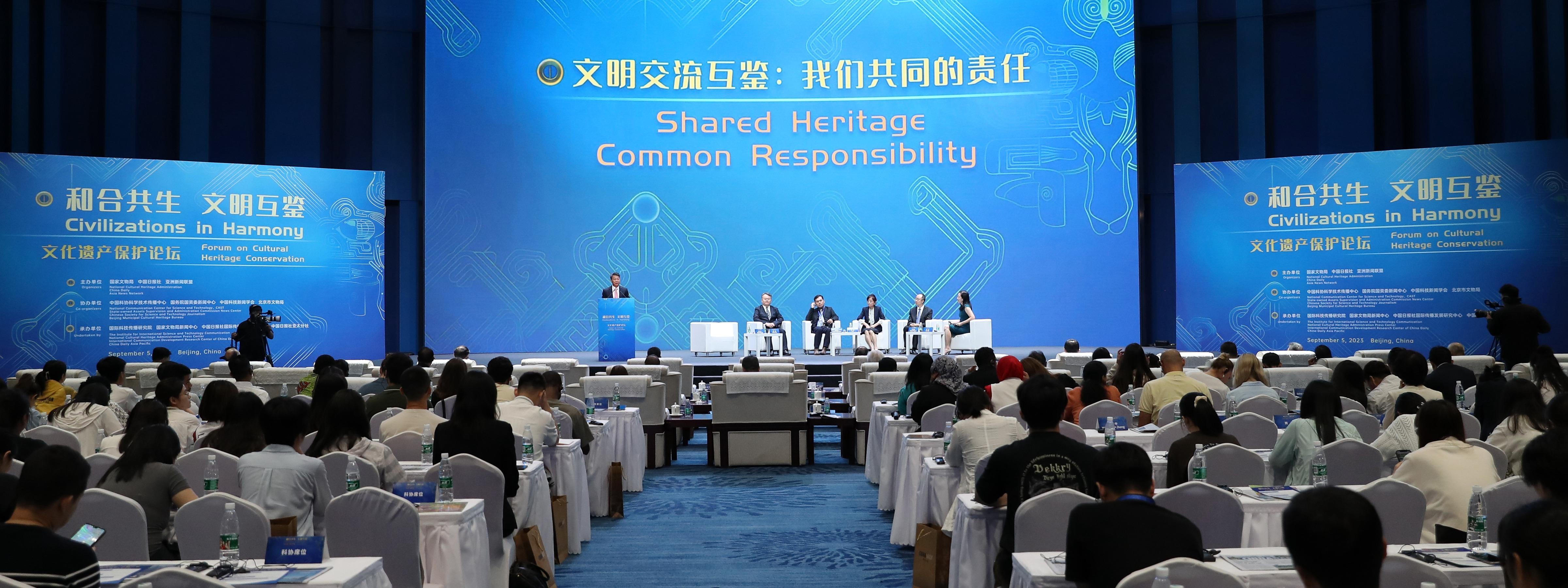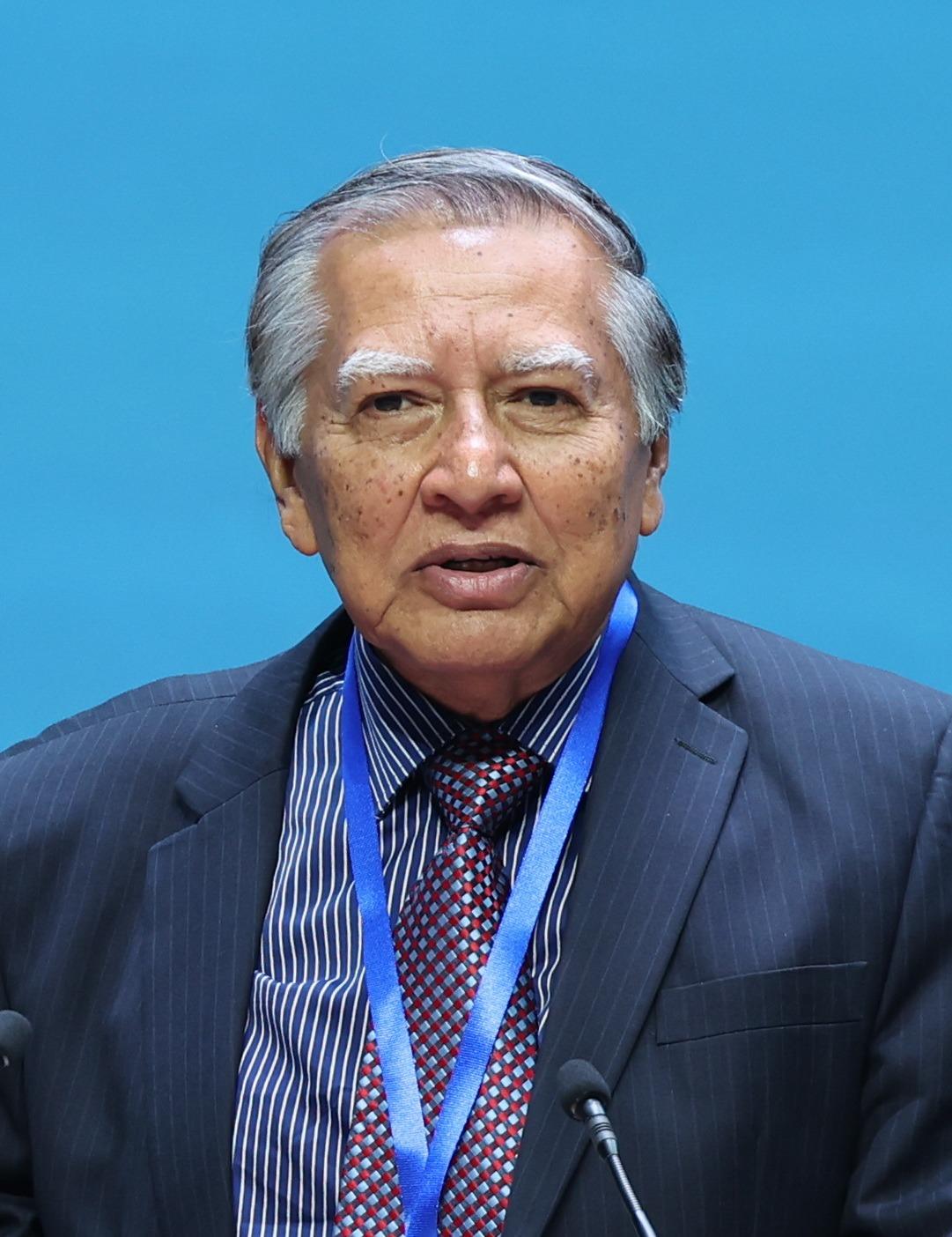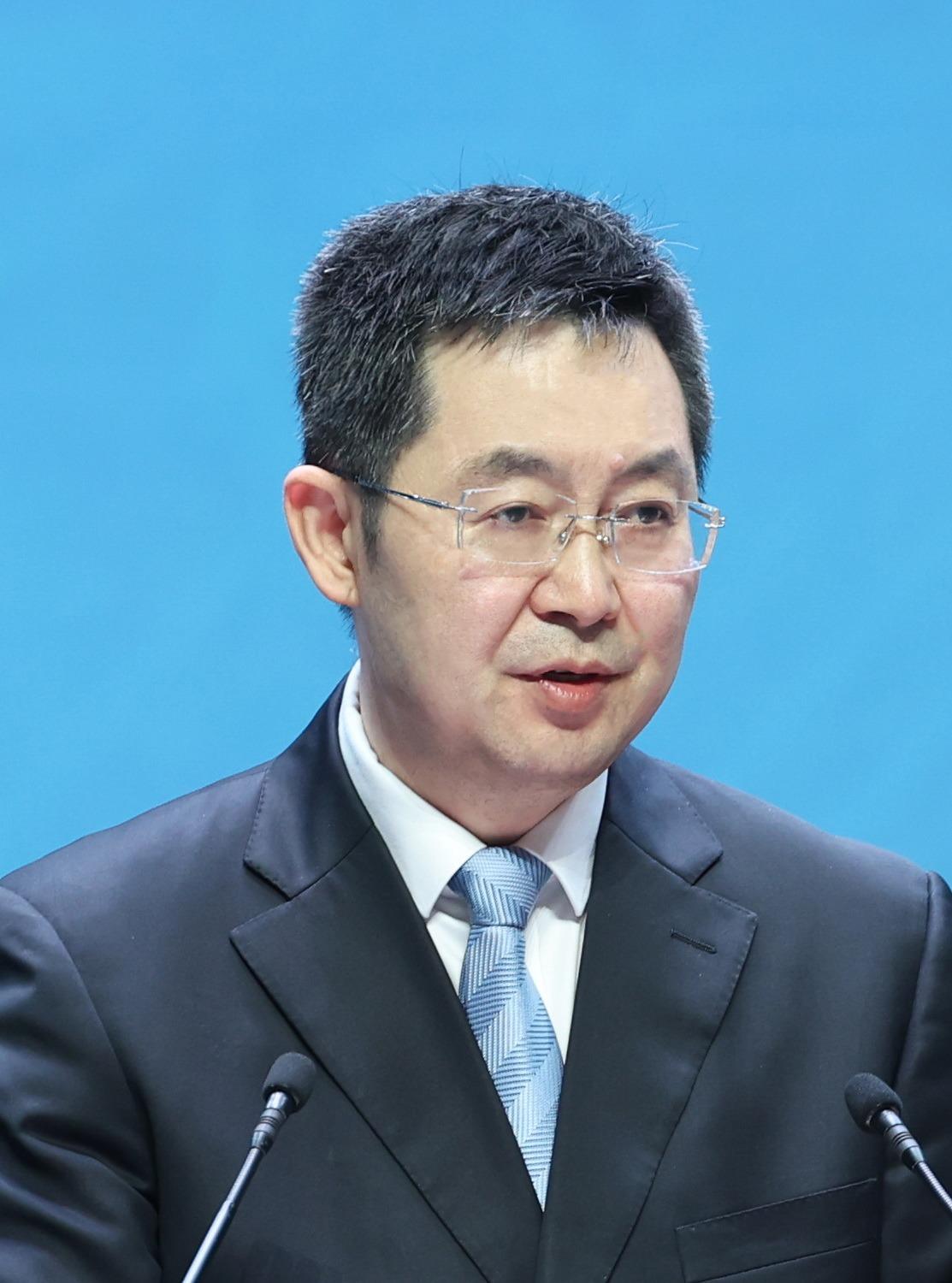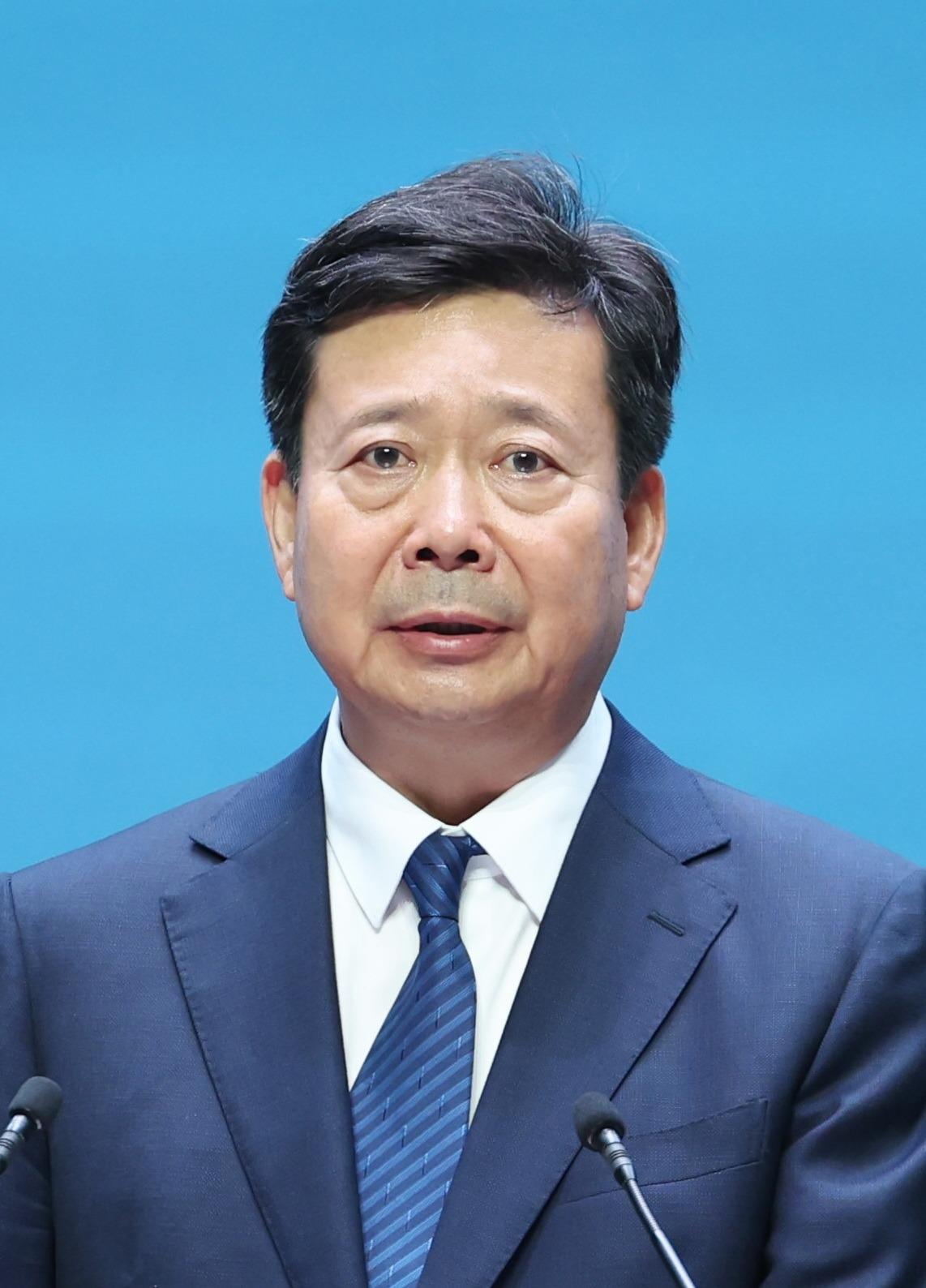Editor's note: China Daily, the National Cultural Heritage Administration and the Asia News Network co-hosted the Forum on Cultural Heritage Conservation with the theme "Civilizations in Harmony" in Beijing on Tuesday. Delegates from news organizations and cultural heritage departments home and abroad gathered to share their insightful thoughts on how to build a shared future for the continent through strength of culture and media.
 The Forum on Cultural Heritage Conservation with the theme "Civilizations in Harmony" is held in Beijing on Tuesday. (WANG ZHUANGFEI / CHINA DAILY)
The Forum on Cultural Heritage Conservation with the theme "Civilizations in Harmony" is held in Beijing on Tuesday. (WANG ZHUANGFEI / CHINA DAILY)
News outlets key to promoting harmony
Conflicts have been a persistent part of our past. Harmony and Peace is what we hope and must build for the future. Diverse civilizations, representing numerous nations and cultures, living in harmony, is a relatively new concept. It evolved in the modern era, based on the learnings from the experiences of endless wars and the destruction. With the proliferation of deadly nuclear weapons it has become the collective responsibility of nations to devise ways to live in harmony as the very survival of humankind is at stake. It is among the most important tasks that we have at hand.
Much progress was made after the World War II, especially in the creation of the UN, its specialized agencies and promulgation of many farsighted treaties and conventions aimed at promoting peace. However, in the recent past, some of the democratic gains of the post-war period have come under serious strain and newer threats to peace and harmony have emerged.
In the midst of all these concerning developments the need for nations to understand each other better, especially in terms of our respective cultures, is now an urgent task. While in the past we looked at cultural diversity with suspicion, in today's world we embrace it as collective heritage inheritance for all humanity.
So the issue is how to build a harmonious world on the basis of greater knowledge and understanding. Knowledge about culture and cultural heritage provides an important avenue to bring that understanding among peoples. It is historically proven that mutual knowledge leads to mutual respect which leads to elimination of prejudice and hatred. The process of increasing mutual knowledge is most effectively driven by people to people contact. However, given the size of populations in each country, most of whom are unable to travel to other countries, it is left to the mass media to help the process of increasing mutual knowledge of the diverse cultures that make for the collective heritage of humankind. Acquiring this comprehensive knowledge is becoming more and more vital in the present day world.
 Mahfuz Anam, Chairman, Asia News Network. (PHOTO / CHINA DAILY)
Mahfuz Anam, Chairman, Asia News Network. (PHOTO / CHINA DAILY)
Media has always been a very important conveyor of culture in all its diversities. With the advent of online platforms and all forms of social media, media's relevance, role and importance has further increased. Today, media, including radio, TV, print and digital platforms, can play a very important and effective role in stopping the incitements to conflict and contestations.
There is no denying the fact that media sometimes depicts cultures of other countries and peoples in a negative light, especially if there is some discord among them. This negative mindset helps to generate an attitude that is more set to find areas of differences rather than those of similarities. Over time this continuous negative portrayal leads to deep-seated hatred and blind prejudice that spreads among the people of the respective cultures. To build a peaceful world the media needs to develop a deeper understanding and respect of the cultural heritage of different peoples of the world. For this to happen we need to cultivate an attitude of inquiry and appreciation.
We should move away from the ideas of "superior" or "inferior" culture. There is really no such thing at least in the modern world. What we have are different cultures with immense diversity which need to be analyzed, deciphered, understood and finally respected. Whatever our historical legacy may be we must understand that we have to live in peace with each other and for that to happen we must understand and respect each other. We must avoid war at any cost. And for that to happen we have to avoid prejudice and hatred that ultimately leads to conflict and even to war. It is my view that independent media has to go much further in changing its present mind-set.
Greater collaboration between the cultural editors of media houses must be encouraged. This will lead to greater information flow between media institutions. If media organizations can bring their multimedia units to team up in production and distribution of cultural productions they can bring about dramatic changes.
Given the tremendous challenges that international cooperation is now facing, global and regional media cooperation in increasing knowledge of each other's cultures can be a great service to creating deeper harmony between different cultural, ethnic and national groups.
Mahfuz Anam, Chairman, Asia News Network
 Qu Yingpu, Publisher and editor-in-chief of China Daily. (PHOTO / CHINA DAILY)
Qu Yingpu, Publisher and editor-in-chief of China Daily. (PHOTO / CHINA DAILY)
Countries should learn together
In 1271, the Nepalese artisan Araniko was invited to Beijing to build the White Pagoda at the Miaoying Temple, which later became one of Beijing's most renowned landmarks. In 2017, China sent a professional team to Nepal and, after nearly five years, successfully completed the restoration of the nine-storey Basantapur temple complex at Kathmandu's Durbar Square. These two events, separated by more than 700 years, are a perfect example of exchanges and cooperation in cultural heritage protection between Asian civilizations. It is precisely through this continuous process of contact, exchange and integration that the Chinese civilization has grown and flourished, engraving inclusiveness and peacefulness into its genetic code and bloodstream, shaping an open and all-embracing culture.
We Asian countries are closely connected and share a natural bond of affinity. We have a common cultural lineage and shared dreams for the future. As the largest cooperative media organization in Asia, the Asia News Network must play a guiding role in promoting the creative transformation and innovative development of Asian countries' fine traditional cultures, drawing on the light of civilization to dispel darkness and illuminate the path forward for human society.
We must stay confident in our culture and tell compelling stories about the inheritance, development, exchanges and mutual learning of Asian civilizations. Cultural confidence is a more fundamental, profound, and enduring power. As the world undergoes major changes unseen in a century, we must stand firm on the side that represents the progress of human civilization.
Tell the stories of exchanges and mutual learning among Asian civilizations well. There are countless cultural treasures in Asia, and we have the responsibility to illuminate the shimmering light of civilizations that are hidden deep in the mountains, or in the collective memory of ancient villages, or even lost over the years, so as to make the shared cultural memories of Asian people shine with an even greater luster. We must creatively develop the Asian civilizations through online innovation using the most vivid, fashionable expressions, so that the ancient and modern cultural achievements can be easily disseminated and understood.
Tell the stories of Asian civilizations' contributions to the world well. Taking Asia as the anchor point, we should build a media cooperation network for dialogue between global civilizations, systematically demonstrate the significance of Asian civilizations to the world, spread the shared values therein for all humankind, promote international people-to-people exchanges and cooperation, and contribute to the blossoming of different civilizations and the continuation of the flame of the human civilization with "Asian wisdom".
We must stay firm to boost confidence and demonstrate Asia's contributions in promoting the development and prosperity of the world. Development is an eternal theme of human society. The paths to modernization of Asian countries are crafted step by step by the people of these nations, guided by their unique historical, practical, and theoretical logic, which constitute some of the most wonderful and profound Asian stories. In June, the Regional Comprehensive Economic Partnership (RCEP) came into full effect, which has released significant dividends and provided surging impetus for regional and world economic development. We must stand firm on the right side of history.
Demonstrate the historical responsibility of Asian countries to jointly build a clean and beautiful world. Asian countries have made de-carbonization commitments in accordance with the 2015 Paris Agreement on climate change, and China, in particular, has made a solemn commitment to the world to achieve its carbon peak, and carbon neutrality, in 30 years. Words must be followed by deeds. Asian countries are shouldering the heavy responsibility of addressing climate change, demonstrating "Asia's role" in protecting the Earth's ecology, and actively working toward building a community with a shared future for all of humanity with the stance of an activist and a doer.
We must strengthen the confidence in our discourse and accelerate the formation of Asia's voice that can match the volume of Asia. Asia's long-term, stable economic growth, cultural prosperity and development have provided the greatest confidence for "telling compelling stories". Asian stories should be written by Asians themselves, rather than by the Western media. This is not only the ideal of the Asia News Network but also a shared mission and responsibility for all Asian media agencies. We must stand firm on the side of fairness and justice.
Adhere to discourse leadership and contribute to the construction of a new global communication order. We must recognize that many Western media outlets still hold a deep-seated bias against Asia. In recent years, Western media's "double standards" in covering major news events, especially their defense of a certain country's hegemony under the banner of "anti-authoritarianism", have aroused alert and antipathy among global audiences. We must explore the construction of a discourse system with Asian features, styles, and ethos, and through narratives that are attractive, compelling and persuasive. We should raise the voice of Asian media to promote the global communication order toward a fairer, more impartial and orderly direction.
Adhere to keeping pace with the times, cultivate opportunities and break new ground through innovative development. We must keep abreast of technological changes, empowering quality content with advanced technologies. Those of the world's younger generation are digital natives and crucial participants of international exchanges. We need to reach out to them, engage in dialogue and win them over with a youthful tone, and use their youthful energy to illustrate Asia's vibrancy, showcasing to the world an image of Asia that is lovely, approachable and full of vitality.
An ancient Chinese saying goes, "with the strength of many, there is no defeat". The Asia News Network will fully implement the action plan for strengthening media exchanges and cooperation adopted at the board meeting on Monday, and continuously attempt to enhance confidence among Asian civilizations, and boost the development and discourse about Asia, by promoting exchanges and mutual learning.
Qu Yingpu, Publisher and editor-in-chief of China Daily
 Li Qun, Director, the National Cultural Heritage Administration. (PHOTO / CHINA DAILY)
Li Qun, Director, the National Cultural Heritage Administration. (PHOTO / CHINA DAILY)
Protection of shared heritage important
President Xi Jinping attaches great importance to the conservation and inheritance of cultural heritage. He proposed the Global Civilization Initiative, and sent a congratulatory letter to the inaugural general assembly of the Alliance for Cultural Heritage in Asia. He emphasizes that Asia is a key cradle of human civilization. It bred and preserved its rich cultural heritage, writing highlighted chapters for world history in civilization development. He calls for respect for the diversity of civilizations, upholding the common values of humanity, and promoting robust international people-to-people exchanges and cooperation.
In order to continuously expand international communication and cooperation in cultural relics, and deepen the Asian Initiative for Cultural Heritage Conservation, we held the inaugural general assembly of the Alliance for Cultural Heritage in Asia in Xi'an, China in April, during which Kong Vireak was elected as General Secretary of the Alliance for Cultural Heritage in Asia. Altogether more than 150 delegates from 22 Asian countries and three international organizations gathered to jointly explore a new path of protection of cultural heritage in Asia. The Asian Fund for Cultural Heritage Conservation has collected 88 million yuan ($12 million) to support the Asian Initiative for Cultural Heritage Conservation. China signed bilateral joint declarations on cooperation of the Asian Initiative for Cultural Heritage Conservation with Afghanistan, Pakistan, Iran, Syria and Cambodia. We cooperated with Bangladesh and five other Asian countries to launch 11 conservation and restoration projects concerning historical monuments. We conducted 33 joint archaeology programs with 19 Asian countries and reached intergovernmental agreements preventing cultural relics theft, clandestine excavation, and illicit import and export of cultural property with Cambodia and Pakistan.
In 2019, The Splendor of Asia: An Exhibition of Asian Civilizations, which gathered 451 groups of cultural relics from 47 Asian countries and two countries with brilliant ancient civilizations, Egypt and Greece, showed the lineage of Asian civilizations and constructed a bridge for people-to-people connectivity.
Diversity spurs interaction among civilizations, which in turn promotes mutual learning and their further development. Cultural heritage is an important outcome of the development of human civilization and natural evolution, and an important vehicle for the exchanges and mutual learning between civilizations. To well protect, inherit and make good use of these precious treasures is our shared responsibility, and is of vital importance to the continuity of human civilization and the sustainable development of the world. We advocate for a more open-minded attitude to implement the Global Civilization Initiative, and promote close international cooperation in the protection of cultural heritage. Through the convergence of diverse cultures, we can advance the exchange and mutual learning of civilizations, and jointly promote the development of human civilization.
First, we will carry out joint archaeological research and deepen research on civilization. With the principles of equality and an open mind, we will encompass major subjects such as human origin, global ancient civilization, and the Belt and Road Initiative to make plans for joint archaeological work and establish sound mechanisms for coordinating joint archaeological efforts. We encourage more Chinese experts to participate in important archaeological work in Asia, and welcome scholars from all countries to cooperate with us in archaeological excavations and civilization research in China. We seek to promote dialogue and harmonious coexistence among different civilizations and provide inspiration for the development of contemporary human society.
Second, we will tell good stories of cultural relics and enhance mutual understanding among people. With a tolerant and sharing attitude, we will work together to strengthen the research and interpretation of cultural relics, historical remains, and archaeological sites, explore the multiple values of cultural relics and cultural heritage, and give play to the communication advantages of the Asia News Network and the resource advantages of the Alliance for Cultural Heritage in Asia. We will jointly build an international communication platform and a cooperation network for civilization dialogue in Asia, so that we can bring back to life relics sleeping in closed palaces, legacies of the vast land of China and records in ancient books, comprehensively present the outstanding characteristics of the Chinese civilization, showcase the achievements of human civilization exchange and cooperation in a comprehensive and in-depth manner and promote mutual understanding and friendship among the people of all countries.
Third, we will expand exchange and cooperation to protect shared cultural heritage. With a win-win cooperation attitude, we will carry out Asian Initiative for Cultural Heritage Conservation, continuously enrich the Asian Fund for Cultural Heritage Conservation. We will promote cooperation projects for the protection and restoration of cultural relics, enhance efforts in disaster prevention and mitigation for cultural relics and promote the cultivation of talent in cultural relic conservation. We will jointly safeguard the cultural and natural treasures of humanity, so that we can make the garden of world civilizations colorful and vibrant.
Li Qun, Director, the National Cultural Heritage Administration


